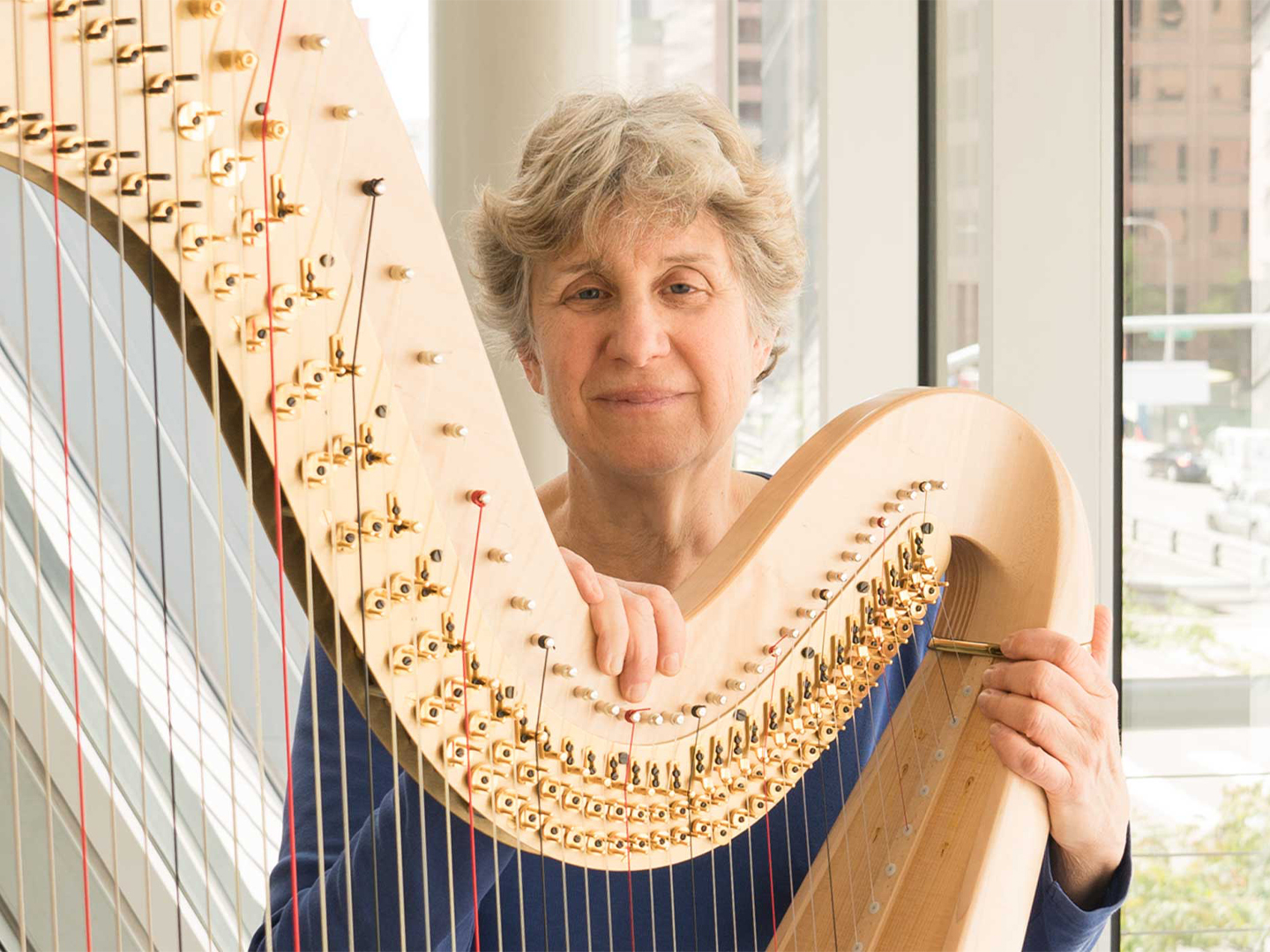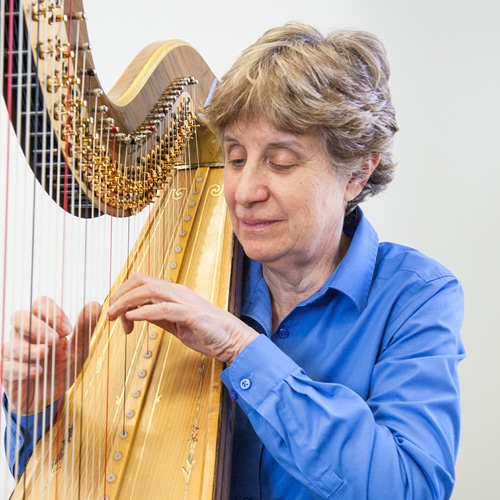
Office Hours with JoAnn Turovsky
By Deanna Gasparyan
In this ongoing series called “Office Hours,” get to know some of the exceptional scholars and artists who make up USC Thornton’s faculty as they answer questions about themselves.
JoAnn Turovsky, Strings
Can you talk about the Beginning Harp class you teach?
It’s open to the entire student body. It doesn’t have to be music majors or harp majors, it’s a non-major class. We have between 12 and 15 people—some of whom have never played the harp before, some of whom have never even read music. It’s an opportunity for two of my graduate students to practice teaching. The class meets once a week and I go through all the material, the technical material, and demonstrate on a harp as they watch. Then they meet individually with each of my graduate students for half an hour of lab, so they get a private lesson. It’s been a very successful endeavor and it’s very unusual because it’s really an opportunity for my graduate students to learn how to teach with supervision, and to have Guinea pigs that they get to try it out on. It works great.
The class is also great for spreading the harp to people who wouldn’t otherwise have an opportunity. In addition to that, because I play with LA Opera, this past semester I was able to take a group of 30 students to an opera that was a very unusual pairing of operas. We performed two one act operas: one of them was by William Grant Still, a prominent Black composer, which had never been performed in Los Angeles. The other was called The Dwarf, another one act Opera. They were able to come and not a single one of these students had ever been to the opera before. They hadn’t even been to the music center. I was able to take a group of them. They didn’t have to pay anything, they got to go for free.
Last year, we did a premiere at LA Opera of Omar, which is a very famous story about a Black Muslim slave. I took another group of students to this opera. In addition to the Beginning Harp students being exposed to instrument, I try to bring my musical and work connections to the class.
What harp do you play?
So, I play something similar to the one in my studio. I play a harp built by a company called Lyon and Healy. Lyon and Healy is the major American harp company. There’s an Italian company called Salvi, and then there’s some smaller ones as well. But I play a Lyon and Healy harp. I actually own seven of them, which is almost embarrassing to say. I like to leave one at the opera, so it doesn’t have to be moved. And I have one that stays with a moving company that I use for motion picture television. They move it for me, so they keep it. I have a gold harp that looks very similar to this, it’s what’s called a Style 23. This one here in my studio is a little bit more ornate. This was a special edition that was donated to us by a patroness, which we’re very lucky to have. I have two of these big gold harps. They’re beautiful. Yeah, there’s no question about that. It’s real gold and gilded. It’s hypnotizing, right?
What advice do you have for young harpists?
My teaching philosophy is that you need to be ready for anything. Hopefully, I’m an example of that because I play different styles and different things like that. But it’s very incredibly important that you get your foundations set first. So your technique is the most important thing. If you have good technique, you’ll be prepared for whatever is presented to you. For example, if you have to sight read or perform, you can rely on your hands and your technique. We work very hard to be technically skilled. In addition to being technically skilled, we want to be confident in our ability so that we feel ready for whatever comes our way. Young harpists should also try to gain experience in several different genres of music.

It’s lovely if someone can win an orchestral job. I’ve had students who are incredibly gifted and talented who have been able to go through that audition process and win, but it’s hard. It’s very hard and there aren’t many openings. There’s only one harp in an orchestra, and harpists tend to stay, of course, if they get a job. That’s a very hard road, so you have to be flexible. You have to be able to do different things. And if you’re going to teach, you need to be good at it. You need to not only teach just because you play. I think it’s about getting your I’s dotted and your T’s crossed so that you’re ready for whatever opportunities come. Being flexible comes next, and then gaining as much experience as you can in every different area.
We really try to make sure here that the students have as many opportunities as possible. They play with orchestras on campus, including opera orchestra. They play with wind ensemble. They play with choral groups. Then, they audition for orchestras that are off campus which are designed for college students. Most of my students play in those orchestras, so they gain additional experience. They also play chamber music and practice teaching here. My goal is to help my students be ready for anything and become well-rounded musicians.
What are your summer plans?
I teach at the Music Academy of the West in Santa Barbara, which is an eight-week program that takes a big chunk out of the summer. Then, I’ll look ahead to the fall opera season and prepare comfortably for big pieces that I know that are coming up, so that I have some leisurely time to practice. One of my main goals now is to clean my harp studio. All the piles of music that I’ve stacked up during the whole year that I can barely see through, I’m going to put away. I have a whole wall of music and half of it’s out now. It’s a stupid goal, but it needs to be done. So unfortunately, that will be high on my priority list.
Do you have a favorite recipe to cook?
I love to bake. I have to stay away from sweets myself but yes, I love to bake. We have harp class every week, so I always try to bring some type of baked good for my students. I’m always looking for new recipes to try and baking is my thing. Hopefully I won’t poison them by accident! I like to make banana bread. There’s something else I like to make that’s called a foley cake, which is like a marzipan with almonds on the top that people really enjoy. That’s probably one of my favorites. But I don’t have favorites. It’s just fun to do it.
***
Featured photo courtesy of Colburn Music Academy


